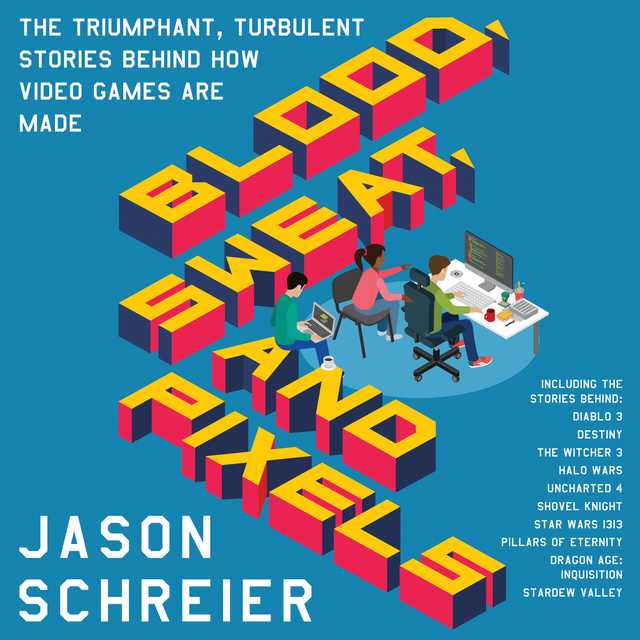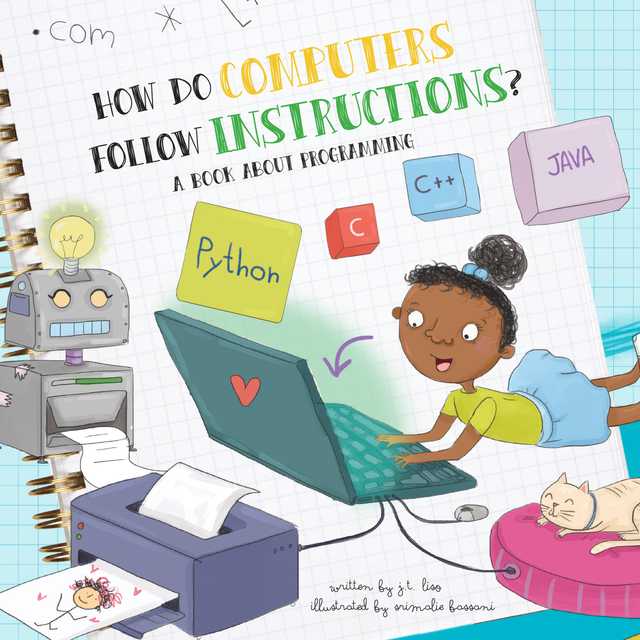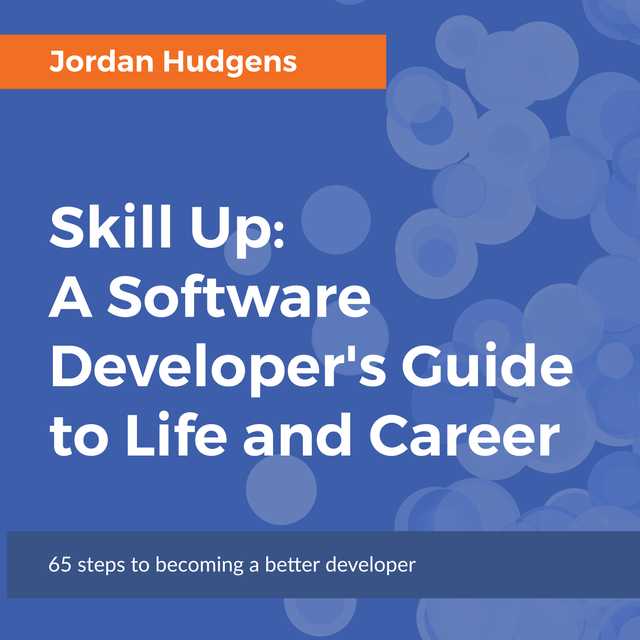Blood, Sweat, and Pixels Audiobook Summary
Developing video games–hero’s journey or fool’s errand? The creative and technical logistics that go into building today’s hottest games can be more harrowing and complex than the games themselves, often seeming like an endless maze or a bottomless abyss. In Blood, Sweat, and Pixels, Jason Schreier takes listeners on a fascinating odyssey behind the scenes of video game development, where the creator may be a team of 600 overworked underdogs or a solitary geek genius. Exploring the artistic challenges, technical impossibilities, marketplace demands, and Donkey Kong-sized monkey wrenches thrown into the works by corporate, Blood, Sweat, and Pixels reveals how bringing any game to completion is more than Sisyphean–it’s nothing short of miraculous.
Taking some of the most popular, bestselling recent games, Schreier immerses listeners in the hellfire of the development process, whether it’s RPG studio Bioware’s challenge to beat an impossible schedule and overcome countless technical nightmares to build Dragon Age: Inquisition; indie developer Eric Barone’s single-handed efforts to grow country-life RPG Stardew Valley from one man’s vision into a multi-million-dollar franchise; or Bungie spinning out from their corporate overlords at Microsoft to create Destiny, a brand new universe that they hoped would become as iconic as Star Wars and Lord of the Rings–even as it nearly ripped their studio apart.
Documenting the round-the-clock crunches, buggy-eyed burnout, and last-minute saves, Blood, Sweat, and Pixels is a journey through development hell–and ultimately a tribute to the dedicated diehards and unsung heroes who scale mountains of obstacles in their quests to create the best games imaginable.
Other Top Audiobooks
Blood, Sweat, and Pixels Audiobook Narrator
Ray Chase is the narrator of Blood, Sweat, and Pixels audiobook that was written by Jason Schreier
Jason Schreier is the news editor at Kotaku, a leading website covering the industry and culture of video games. He has also covered the video game world for Wired, and has contributed to a wide range of outlets including The New York Times, Edge, Paste, Kill Screen, and The Onion News Network. Blood, Sweat, and Pixels is his first book.
About the Author(s) of Blood, Sweat, and Pixels
Jason Schreier is the author of Blood, Sweat, and Pixels
More From the Same
- Author : Jason Schreier
- Press Reset
- Publisher : HarperAudio
- Abraham
- American Gods [TV Tie-In]
- Dead Ringer
- House of Sand and Fog
- Prey
Blood, Sweat, and Pixels Full Details
| Narrator | Ray Chase |
| Length | 7 hours 58 minutes |
| Author | Jason Schreier |
| Category | |
| Publisher | HarperAudio |
| Release date | September 05, 2017 |
| ISBN | 9780062790903 |
Subjects
The publisher of the Blood, Sweat, and Pixels is HarperAudio. includes the following subjects: The BISAC Subject Code is Business & Economics, Computers & Information Technology, Industries
Additional info
The publisher of the Blood, Sweat, and Pixels is HarperAudio. The imprint is HarperAudio. It is supplied by HarperAudio. The ISBN-13 is 9780062790903.
Global Availability
This book is only available in the United States.
Goodreads Reviews
Tim
April 12, 2019
I picked this book up for one reason: to learn why Diablo 3 was such a letdown. I vaguely remembered a well-known developer posting "F*** that loser" on Facebook in reference to a past contributor criticizing the new game and that being a big deal. I really hoped to get the full story behind what went on there. Speculation on Blizzard's next Diablo venture would have been cool, too. Really, I would have read a book entirely about the Diablo franchise.By the time I got to the Diablo 3 section, I was enamored by Jason Schreier's writing. I'm kind of embarrassed to admit that I knew little about any of the games developed aside from their names. That is, aside from recollection of my reaction to the Halo Wars announcement: "Something fishy is going on here." I'm so far behind the times that when Schreier kindly mentioned that Diablo 2's mechanics had been antiquated by more modern games, I honestly had no idea what games he was referring to. I need to get out more. This is a saying which, when extended to the realm of gaming, means the exact opposite.I ended each chapter totally stoked for each game (and will probably buy Stardew Valley this weekend). What makes Jason such an effective writer for this subject matter is that he doesn't come off as a geek. I don't know how else to say it. He can communicate the joy of gaming to people that haven't experienced it- ever. In my case, he brought back memories that were long forgotten.As an aspiring project manager and journeyman engineer, I found each tale of taking product to market fascinating. It's a few steps away from a business case study. Does the prevalence of "crunch time" become excessive? Yes, but it sounds like a lot of fun to me. The way that the teams are formed and how they deal with requirements passed down from the top of the organization could have been explained in greater detail, in fact. Great video games are culturally significant treasures, much like artwork or a fine wine. Just kidding about the wine. Capturing what has gone into some of the masterpieces of our time that transcends the underlying subject is important and exciting. I really enjoyed the book.View this review and others on my blog
Erik
March 19, 2019
Dear Goodreads Father, forgive me, for I have sinned: I love video games as much as I love books. It's true, I put them on an equal level. I know it is blasphemy, but I cannot help this corruption of my heart. Truth is, I love anything with a story, no matter the medium. Film, TV, books, video games, the secret hearts of strangers... But, yes, video games, the newest and most immature of these media and therefore the one with the most room for growth. I have been there from nearly the beginning and have watched it bloom from pixellated graphics, childish themes, and simplistic mechanics to what we have today, a verdant garden of diverse flowers, some merely a joy for the senses to behold but others a newer, more active exploration of humanity.I've watched the culture of gaming grow too. I remember the days when being a gamer made you a GEEK (that is, a NERD). TV & film invariably depicted gamers as ultra-nerds and outcasts (think Stranger Things’ depiction of the kids). They weren’t wrong, exactly, but still, what made this hobby of mine inferior to the hobby of people gathering around a TV to watch grown men toss around a ball?I didn't know and, for me, gaming felt a secret shame.I remember, too, the first time I played an online game, in the late 90s. My uncle showed me a WW2 airplane dog-fighting game, and it blew my mind! People from all over the world connected to play with each other in real time, to engage together anonymously in this secret hobby. In that moment, in my mind, the world was made irrevocably smaller. Ever after, I found the idea of borders and countries rather quaint. I could feel no hate, no out-group bias, toward those of other countries, for such distance was but a light-speed hop and skip through the fiber optic nerves of the Internet.Point is, I’m a huge fan of video games, so I thoroughly enjoyed Blood, Sweat, and Pixels, which gives a concise but intimate peek into the development and developers of some of the most popular games of the past decade. It’s all too easy to forget that behind these fantastical, otherworldly creations are artists who have sacrificed heavily to turn their vision into reality. That’s probably why my favorite chapters were about the indie teams or studios, like those behind Shovel Knight, Stardew Valley, and Pillars of Eternity. Their stories are all inspiring triumphant under-dog stories.This is especially gratifying to me because I backed (on Kickstarter) the original Double Fine Adventure, despite absolutely hating adventure games, *solely* to demonstrate the viability of developer studios making games independently, without a publisher. The democratization of game development, if you will. So it was highly pleasing to me to read how Obsidian was inspired by the success of DFA to make their own Kickstarter for the isometric cRPG, Pillars of Eternity. Kinda feels like I helped make that possible, y’know?With that said, I don't think any particular knowledge or engagement of video games is necessary to understand this book, as it’s written quite simply and many video game terms and systems are explained for those who may not know them. At the same time, there's no denying that a familiarity with video games does help one appreciate this book.For example, one of the chapters is on Diablo III, and this chapter focuses heavily on the RMAH (Real Money Auction House). Before release, myself & others lobbied Blizzard to remove this system from their game because it would create a conflict-of-interest: the designers would need to make loot sparse and unsatisfying, in order to funnel players towards the RMAH. You never want that - adding tedium and inconvenience, just so people will pay to avoid it. That's bad design. Maybe even unethical, in its exploitation of people's addictive tendencies.Of course, Blizzard ignored us. And surprise, surprise! we turned out to be correct, and the RMAH was eventually removed, a process that is touched upon in this book. So I have a lot of history that made reading this book a bit like seeing Wizard of Oz behind his curtain.In summary, it’s easy to recommend this book to anyone who is a gamer, whether they’re specifically familiar with the games or not (There’s ten chapters/games: Diablo 3; Destiny; Witcher 3; Halo Wars; Uncharted 4; Shovel Knight; Star Wars 1313; Pillars of Eternity; Dragon Age: Inquisition; & Stardew Valley). For those who aren’t gamers, it’s still a light, humanizing read about an industry that is swiftly becoming a juggernaut and may even one day become the King of Story.
Maurício
May 15, 2018
So you think your job as a software engineer sucks? Think again, you could be working on games!Nightmarish environments with total and complete lack of management, direction, tooling or even a common dictionary, a bootload of manual testing and very little feedback until you finally deliver the final game to customers. Now add a sprinkle of 100 hour weeks (yes, you will work on weekends), no overtime pay and very little financial incentive and you end up completely burned out, broke and most likely needing to visit a doctor at the end.It is indeed surprising that we do get to play games with the incredible amount of madness that is involved in making them. It's even more surprising that people continue in the industry after going through these maddening and soul sucking crunch periods and delivering sub par games that don't live up to the expectations.Including both indie and AAA games, "Blood, sweat and pixels" is a cautionary tale about the industry of games, while the heroism sagas to deliver that amazing game sound cool, they were most likely not cool for the people involved and the burnout they must have felt after it. The gaming industry definitely feels like an amateur cult, where even the most basic pieces of software engineering are thrown out for the sake of "art", whatever that is supposed to mean.Studios lack clear leadership or management. Ensemble's "Halo Wars" chapter, with 3 different teams working on 3 different games when the only thing they should be working on is "Halo Wars" borders insanity, with people employed in the company just refusing to do what they were supposed to do like spoiled teenagers, eventually leading to the end of the studio, is just one of the examples.Then you get to "Dragon Age: Inquisition", where the team decided to use the Frostbite engine but had no idea it was completely bereft of the features they would need to build an RPG (I mean, it was an FPS engine, maybe prototype and spike before you decide on it?). The team worked for more than a year "building" a game in feels only since they just could not play or do anything for real, luckily for them it worked out, but we all know the long list of games that just didn't make it.Bungie's "Destiny" and it's fraught relationship with Activision that wasn't even an issue with Activision itself, as many would like to blame. Oh, it's the big corp owning the scrappy game developer. Nope. The wounds are almost all self inflicted, lack of communication between the people doing the story and building the game, lack of an holistic view of what the game should be and the usual over-promising. As much as it's cool to blame the huge corp, as a Bungie employee said, "we had to hold ourselves accountable now that we were free of microsoft" but they just weren't doing it. They went on to fight publicly with Activision on twitter but had to redo the game completely with less than a year for the final release that and we got the story we had on Destiny 1. Given how Destiny 2 came to be, the whole drama has most likely repeated itself.Seeing the backstory of how these games are made makes me value them a bit more but also makes me sad at how the people building them are doing it mostly for passion and are getting the short end of the stick almost all the time. Amazing book!
Daniel
August 07, 2021
"Oh, Jason," he said. "It's a miracle that any game is made."Finally, a book that captures the complexity of game development that anyone can pick up and enjoy. Jason Schreier of Kotaku spent two years traveling around the world to score in depth interviews with the industry's most renowned gaming studios. Drawing from sources speaking both on and off the record, Blood, Sweat, and Pixels provides a rare glimpse into the pain and passion that go into bringing a modern video game to market. In ten absorbing chapters Schreier covers the downright grueling development process behind such hits as Blizzard's Diablo III, Naughty Dog's Uncharted 4, CD Projekt Red's The Witcher 3 and, of course, Bungie's Destiny.Speaking of Destiny, it was Schreier's crucial 2015 exposé that laid the groundwork for this wonderful little book. (Portions of his chapter on Destiny are taken directly from that article.) As fans of the blockbuster series will remember, that Kotaku piece brought Destiny's murky origin story to light. Importantly, it provided the necessary background for understanding how the company that gave us Halo could have produced — at least at launch — such a lackluster title. Subpar development tools, a strained relationship with publisher Activision, and the complete reboot of the story (following the departure of lead writer Joe Staten) a year out from release had much to do with it. As a source tells Schreier, “A lot of the problems that came up in Destiny 1...are results of having an unwavering schedule and unwieldy tools."What we learned then from Scheier's keen reporting, and what comes across clear as day in his first book, is that making games is incredibly hard and almost impossibly demanding. Harder, perhaps, than any other creative medium. Thanks to their interactive nature and sheer potentiality, games are capable of delivering the boundless, memorable experiences we've come to love. But it's those same elements that make them such a chore to create, even for seasoned veterans. One of the designers at Obsidian (of Fallout: New Vegas fame) he interviews puts it this way: "making games is sort of like shooting movies, if you had to build an entirely new camera every time you started." Indeed, the tools and technologies used to develop the latest games are constantly in flux, as is the creative vision of the producers and directors at the top. A change in either area can prove hugely disruptive to the overall process — one that hinges on pushing a marketable product out the door by an agreed upon deadline. It's that constant give and take between concept and technology, between developer and publisher, that defines the medium. Internal conflicts can also run a project off course. Artists and programmers might spend months, years even, sketching and coding characters, environments, quests, set pieces and combat mechanics, only to see it all thrown out as a result of higher-ups taking the game in an entirely different direction. When Naughty Dog replaced Uncharted 4's creative director Amy Hennig in 2014 — roughly two years into the game's development — the story was more or less scrapped. That meant that cut scenes, animation, and thousands of lines of recorded voicework on which the studio had already spent millions of dollars got the axe, too. For an artist emotionally invested in their work, this can be heartbreaking and demotivating.In other cases, such as the abortive Star Wars 1313, a decision by the publisher can bring it all crashing down. As Scheier recounts in the closing chapter, LucasArts, formerly a subsidiary of Lucasfilm, began work on a new action-adventure Star Wars game in 2010. The game debuted at E3 in 2012 to wide critical acclaim. Shortly afterward, the company was acquired by Disney. By 2013, Disney had shuttered the studio and canceled every one of its projects. For all the work the dedicated crew at LucasArts poured into their pet project, Star Wars 1313 was never meant to be.Given the many technical hitches, logistical nightmares, corporate pressures, and unforeseen obstacles that threaten success, it's no small wonder that any games are shipped at all. As Schreier points out, there's hardly a game on the market today that doesn't run up against insane crunch periods and dramatic setbacks over the course of its development. Whether it's a small team working on a 2D side-scroller à la Yacht Club Games' Shovel Knight or a massive effort spread across hundreds of staff in the case of BioWare's Dragon Age, producing a quality game in today's highly competitive environment is by any measure a herculean effort. Virtually every insider consulted for the book talks about how taxing the job can be on one's physical health and personal relationships. Burnout is common. And even with working around the clock for months on end — often sans overtime pay, as it's not required in the U.S. — games rarely come out on time. Delays and cancellations are a feature, not a bug. To be sure, any successful career in game development is built on passion and an enthusiasm for creating unique playable spaces, but it comes with significant costs that only the truly dedicated may be equipped to endure.Closing ThoughtsLeave it to Jason Schreier to shatter any utopic notions about game development. Behind the glossy visuals and destructible environments we take for granted on screen lies a hellish landscape of Sisyphean creative challenges and brutal working hours. As the title suggests, Blood, Sweat, and Pixels constantly reminds us that game production is as much about self-sacrifice as it is about crafting quality interactive experiences. And if these breezy oral histories are any indication, it's a principle that holds true whether you're a bootstrapped indie developer beholden to Kickstarter donors or a lowly cog in the big-budget corporate machine.Schreier is a most welcome guide, bringing more casual readers up to speed on esoteric conversations ranging from rendering paths and game engines to bug testing and content iteration times. It's a testament to his talents that the book never seems to flag, even when exploring games I didn't particularly care about. While I wish Schreier had ventured deeper into the ethics of crunch culture, his penchant for meticulous, well researched investigative journalism is on full display here.If you have even a passing interest in gaming be sure to pick this one up. I came away with a better understanding of the personal sacrifices and creative compromises that appear to go hand in hand with making video games, and a newfound perspective on increasingly commonplace monetization strategies like paid downloadable content (PDLC) and microtransaction (MTX) systems. Above all, it left me with a more profound appreciation for my most cherished hobby.Note: This review is republished from my official website.
Kyle
September 24, 2020
Reading this book was a surprisingly personal experience for me. It covers the development of a wide selection of AAA and indie games--and, since I've developed two indie games, getting a glimpse of the pros initially felt like a window into very different world. But it's a fascinating reminder that, no matter what level you're working at, games are basically just hundreds of hours of monotony and fumbling in the dark. They're huge, complex, and it's almost like they "want" to be broken. Human error interferes at every level; that polished final product emerges only slowly from chaos, and is never everything you dreamed it would be.The chapter about Eric Barone, the developer of Stardew Valley, especially resonated with me, as he spent something like five years tinkering with his game in isolation. I lived very similarly to this in my early 20s, when I was making The Pale City; it's a very peculiar, insular life, one that even a background as a novelist had barely prepared me for. Between March and June this year, I briefly went back to game development to make "Home: A Quarantine Story," a short adventure game/interactive novel about a young woman stuck at home during the early days of COVID-19. Every day, life took on a very familiar rhythm: wake up; work on the game, pausing only to cook, exercise, and work remotely; then, at the end of the day, relax for an hour or two, and do it again.Even that short game took hundreds of hours over just a few months--and professionals put in hours like this for years, often doing dozens of hours without being paid! I had always assumed that, in big studios, things ran more smoothly--but in many ways it seems much tougher than working on a small project by yourself. I especially appreciate the author's descriptions of how the developers feel after the project is done. Many seem deflated rather than ecstatic, awkwardly making brief returns to normal life before the next crunch begins... though, as the games covered are largely successful, most of the stories at least have happy endings. This definitely isn't the case for thousands of games that get buried beneath Steam's algorithms every day, and it's incredible to think of how much work was required to make the thousands (millions?) of games on there already.The other inescapable question of this book is: is it worth it? I'm very unsure whether I plan to continue making games, and after reading this book, I'm surprised that many of these developers keep at it, especially when they have to contend with shareholders, changing leadership, the fickleness of the market, etc. But, whenever I do start playing again, this book has given me a much better appreciation of the sheer difficulty of bringing one of these things into the world, at any level.
fonz
December 07, 2017
Cuando uno entra al típico foro de videojuegos no es raro llevarse la impresión de que la masa consumidora de ocio electrónico está compuesta de críos malcriados que, desde el desconocimiento de conceptos básicos del mundo laboral, la economía e incluso la vida real, despotrican con vehemencia de las desarrolladoras del objeto de sus desvelos. Es como si fueran niños pequeños jugando a castillos en la arena, quejándose del clima y las mareas de un inmenso océano cuyos entresijos desconocen. Pues bien, este libro debería ser lectura obligada para todos ellos, es ameno, es informativo y te explica perfectamente las enormes vicisitudes que conlleva sacar adelante un proyecto complejísimo como es un videojuego, quizá el producto cultural cuya elaboración mejor representa los entresijos de nuestra sociedad post-industrial. Un proceso en el que intervienen cientos de personas a lo largo de varios años, absolutamente imprevisible, un deslizarse a toda velocidad sobre el filo de una navaja sometida a multitud de fuerzas tecnológicas, económicas, comerciales, laborales y personales, un caos de partes móviles interconectadas entre sí y que, a menudo, se elabora prácticamente a ciegas y sobre la marcha.En el debe, pues quizá para el ya iniciado resulte algo superficial, dada la naturaleza de una obra concebida como la recopilación de varios artículos de divulgación periodística sobre el desarrollo de diferentes videojuegos. Por poner un ejemplo, muchas veces se nos dice que una mecánica o un diseño de niveles "no funcionan" o resultan aburridos, pero nunca se nos explica el por qué, quizá no había espacio para estas cuestiones más técnicas. Por otro lado la selección de títulos no es especialmente variada, de diez desarrollos, tres tratan acerca de juegos de acción/aventuras tipo Uncharted y otros tres sobre RPGs, dos de ellos action-RPG en tercera persona (el género favorito del autor según confiesa en una nota al pie). No hay ningún juego deportivo, ni de carreras, ni "casual", ni de móviles, ni de lucha... Las historias también parecen escogidas según similares desarrollos narrativos un tanto melodramáticos, la historia de éxito y superación de enormes adversidades es la tónica general, salvo en el caso del desarrollo en solitario de Stardew Valley, la obsesión de un tipo que llega a absorber su vida (es muy interesante este capítulo que subraya lo ineficiente que resulta desarrollar un videojuego en solitario, aunque en este caso resultara un éxito) y la emotiva historia del fracasado Star Wars 1313, a los que quizá podríamos añadir el agridulce final de Destiny. En todo caso, y a pesar de las pegas, una lectura entretenida, informativa y recomendable.
Caitlin
February 27, 2018
"One surefire way to annoy a game developer is to ask, in response to discovering his or her chosen career path, what it’s like to spend all day playing video games.”In Blood, Sweat, and Pixels, Jason Schreier gives readers a behind-the-scenes look at some major videogames (successes, failures and everything in between) to show what it’s like working in the video game industry. Among the games that Schreier looks at are Destiny, Stardew Valley, Shovel Knight, Dragon Age Inquisition and the fabled Star Wars 1313 that never came to be. Each chapter is devoted to one of the games, often with a particular theme or lesson that came of the development of that game. As someone who has devoted a lot of hours in my life to video games, it was fascinating to get a closer look at video game development. While I knew enough to know that developers don’t just sit around playing games all day, there was a lot of the process that I wasn’t aware of. More than anything else, this book is a reality check about how many different aspects go into video game development and just how difficult that process can be. There are plenty of rewarding moments as well but Schreier doesn’t shy away from the less fun parts of the job. I have a fair number of friends who aren’t fans of Kotaku (on which Schreier is a writer) because of the clickbait aspect and some of the reporting but I’d have to say that overall, Schreier’s writing is informative and interesting, without getting too bogged down in details or opinions. I say mostly because there is a single glaring exception: Dragon Age Inquisition. I’m not sure what the point is of poking the bear that is the rage against EA but it was more than a little annoying to have Schreier spend the first few pages of the chapter talking about how ridiculous it was that gamers voted EA the worst company in the world and that people should really be nicer about how terrible Dragon Age 2 was only to then admit that the things that made gamers frustrated with it was in fact due to the timetable that EA required of Bioware. So….perhaps not so ridiculous then? It was the same kind of unnecessary pot stirring that myself and others have previously complained about with Kotaku. It was the only chapter in which I found myself irritated rather than interested. Overall, Blood, Sweat, and Pixels is a great look behind the scenes of some of the biggest videogames in the last couple decades and about how video games are made in general. It presents both the triumphs and the failures of various different companies and the aims for the games that they tried to create. It’s not perfect but if you enjoy video games, it’s well worth picking up.
Philipp
October 24, 2018
Alternative title: How the sausage is madeFun collection of essays/articles on how computer games are made, one game per chapter/article. Most of these games are fairly new, so if like me you're born in the 80s chances are you won't have played them (some games: Diablo III, Witcher 3, Uncharted 4, Stardew Valley, Pillars of Eternity). Some stories are success stories (Witcher 3), some are failures (Star Wars 1313, cancelled when Disney bought Lucasarts).What struck me was how little planning or governance these companies are doing. These people aren't amateurs, their games make more money than the biggest movies, yet they flounder around and chaos reigns. A lot of that must have been visible early - here for example Schreier describes the chaotic process in which Destiny was developed, people must have known that the first version of the story was complete garbage, yet it was only changed at the very end of the development process. Absolutely no planning, some of that is understandable - as Schreier writes, it's very hard to predict whether a game will be fun, so you have to iterate a lot, but still - at some point the industry should have become better at predicting how good their game is going to be? Funny enough, the one game that reads like it was actually well-planned came from the industry outsiders from Poland, Witcher 3.In the programming community, games development is a notoriously terrible area to work in, with constant crunch and death marches. I can now understand why that is the way it is.
Ioana
June 23, 2018
When a book makes you miss your station twice, you know it's a good one. I originally picked this up with the premise of 'I'm reading this for work', but I ended up really enjoying it and even played Stardew Valley and looked further into 'The Witcher 3'! I am not a massive gamer, but I do have my niche of games I get caught into ('The Sims', 'Need for Speed' to name a few) so I was at least hoping that if I read it for work I might find something that I would like to explore further and that would give me that immersive feeling I had about playing games when I was a teenager.What I especially liked about this book was that they were not all success stories. One of the games wasn't even released, it was scrapped when it looked like it was heading in the right direction. Others were released with mediocre or even poor reviews, yet their teams committed to delivering improvements via patches until years after. It's honest, gripping and at times frustrating, but it sounds like that's the reality of the industry, and acknowledging and talking about failures are just as important as talking about success.Some stories I found particularly interesting were that of 'Stardew Valley' (created by a single person), 'The Witcher 3' (made by a Polish studio, very much the underdog in the business) and 'Dragon Age: Inquisition' (how can you match up with past AAA games you yourself have released). I would highly recommend this to anyone, whatever medium of story-telling you're into - if nothing else, you might have a game or two to check out at the end of it.
Tymciolina
May 23, 2020
Branża gier od podszewki.Jako zapalony gracz, byłam ciekawa drogi od pomysłu na grę do jej bombastycznego efektu (ach te dłuuugie godziny przy Wiedźminie, Dragon Age, GTA, Horizon Zero Dawn, Heroes III, o The Last of Us już nie wspomnę ;). Dzięki Jasonowi Schreierowi przemierzyłam tę trasę wzdłuż i wszerz z niejednym developerem. Małym i dużym, odnoszącym sukcesy i pragnącym tychże, ponoszącym klęskę i otrzepującym się. Zrozumiałam dlaczego gry są tak drogie. Dowiedziałam się jak powszechny jest crunch, w jak bardzo nieludzkich warunkach pracują developerzy i dlaczego mimo to dalej to robią. W telegraficznym skrócie, branża gier to stan umysłu, prawa fizyki nie mają do niej zastosowania.Ciekawych informacji dostarczył mi zwłaszcza rozdział o naszej chlubie narodowej czyli Wiedźminie. Jak miło było się dowiedzieć, że za fenomenalne questy odpowiedzialny jest pisarz Jakub Szamałek. Inaczej teraz będę patrzeć na jego twórczość.Freaków do lektury zachęcać nie muszę, ale i tak napiszę, że" Krew, pot i piksele" czytało mi się tak dobrze, że aż odpalę po raz enty Wiedźmina.Ps. Jeżeli oczekujesz poradnika jak tworzyć gry, ta książka nie jest dla ciebie. Albo kup poradnik (jeżeli ktokolwiek będzie skłonny sprzedać tak limitowaną wiedzę za parę złotych) albo zatrudnij się u znanego developera i zdobądź tam doświadczenie. Sekretów i szczegółów branży raczej nikt zdrowy na umyśle, ot tak, nie zdradzi.
Frequently asked questions
Listening to audiobooks not only easy, it is also very convenient. You can listen to audiobooks on almost every device. From your laptop to your smart phone or even a smart speaker like Apple HomePod or even Alexa. Here’s how you can get started listening to audiobooks.
- 1. Download your favorite audiobook app such as Speechify.
- 2. Sign up for an account.
- 3. Browse the library for the best audiobooks and select the first one for free
- 4. Download the audiobook file to your device
- 5. Open the Speechify audiobook app and select the audiobook you want to listen to.
- 6. Adjust the playback speed and other settings to your preference.
- 7. Press play and enjoy!
While you can listen to the bestsellers on almost any device, and preferences may vary, generally smart phones are offer the most convenience factor. You could be working out, grocery shopping, or even watching your dog in the dog park on a Saturday morning.
However, most audiobook apps work across multiple devices so you can pick up that riveting new Stephen King book you started at the dog park, back on your laptop when you get back home.
Speechify is one of the best apps for audiobooks. The pricing structure is the most competitive in the market and the app is easy to use. It features the best sellers and award winning authors. Listen to your favorite books or discover new ones and listen to real voice actors read to you. Getting started is easy, the first book is free.
Research showcasing the brain health benefits of reading on a regular basis is wide-ranging and undeniable. However, research comparing the benefits of reading vs listening is much more sparse. According to professor of psychology and author Dr. Kristen Willeumier, though, there is good reason to believe that the reading experience provided by audiobooks offers many of the same brain benefits as reading a physical book.
Audiobooks are recordings of books that are read aloud by a professional voice actor. The recordings are typically available for purchase and download in digital formats such as MP3, WMA, or AAC. They can also be streamed from online services like Speechify, Audible, AppleBooks, or Spotify.
You simply download the app onto your smart phone, create your account, and in Speechify, you can choose your first book, from our vast library of best-sellers and classics, to read for free.
Audiobooks, like real books can add up over time. Here’s where you can listen to audiobooks for free. Speechify let’s you read your first best seller for free. Apart from that, we have a vast selection of free audiobooks that you can enjoy. Get the same rich experience no matter if the book was free or not.
It depends. Yes, there are free audiobooks and paid audiobooks. Speechify offers a blend of both!
It varies. The easiest way depends on a few things. The app and service you use, which device, and platform. Speechify is the easiest way to listen to audiobooks. Downloading the app is quick. It is not a large app and does not eat up space on your iPhone or Android device.
Listening to audiobooks on your smart phone, with Speechify, is the easiest way to listen to audiobooks.






























